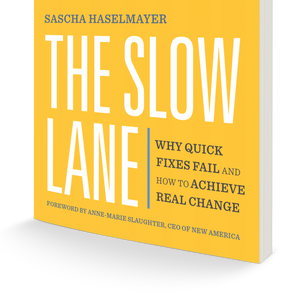This is a book review of sorts. When I first saw Michael J. Sandel’s book “The Tyranny of Merit”, I thought: New York. I felt that I knew exactly what this book is all about: After all, all around us, families were helicoptering their children to get a step ahead on their way to the top in ways I had never seen before. Endless test prep tutoring, picking out strategies for getting the edge in applying to (public) middle schools, that would give you the edge on getting into the right high schools, to get you to the right college, and on and on. Merit, in this way, is a tyranny plaguing families. And ruining young lives not just in Brooklyn, but the world over.
“We should focus less on arming people for meritocratic combat”
But Michael J. Sandel offers a much bigger, more comprehensive picture. He is a professor of philosophy, after all. Where my instinct was to think of the pain inflicted on those young souls in their race to the top, his book dwells on those left behind. And in particular, on how not succeeding in a meritocracy, where everyone supposedly gets what they deserve, eats away at their sense of self-worth, dignity and self-efficacy (their belief that they can make a difference). That, in turn, breeds the kind of frustration and anger that brought about Brexit and the Trump presidency.
“The meritocratic ideal is not a remedy for inequality; it is a justification of inequality.”
Merit Is No Way to Organize A People
Despite its roots in religion, meritocracy, as we know it, is a new construct that got traction in part because it promised equal opportunity over inherited title and privilege. Sandel shows how merit actually makes a very poor way of organizing society. Too much of our political discourse focuses on how we can create more equal opportunity in a meritocratic world, instead of questioning the idea itself. In his telling, the meritocracy reveals itself as yet another Fast Lane mindset. One in which people are trapped in a race to the top, and in which the winners end up taking all (and pass it on to their offspring). And in which those with power use merit to justify their outsize ability to shape the world around us. This vision is best captured by the notion, repeated endlessly by presidents and other political leaders alike, that we will rise as far as your talents and hard work can take us. Or shorter: the Media used the term “you deserve it” four times more often in 2008, than in 1970.
The misconception starts with talent. Talent is not an objective good, but generally only really worth something if it happens to coincide with market value. Sandel provides an example: Take LeBron James, an exceptionally talented basketball player. His talent yields fame, fortune and social standing. It is luck, that society happens to value this particular talent, as an equally talented world champion arm-wrestler, might attest, who in turn receives little reward or social standing. Talent, in Sandel's telling, is mostly the luck of being good at what the market happens to value. The second part of the slogan, hard work, reveals itself as equally fickle—and relentlessly tied to talent. As much as we would like to believe that we control our destiny, it really is mostly a matter of luck, of fitting into the values of the existing markets and powers.
Merit In What?
Merit, of course, does little to explain, what success actually means. A casino magnate may earn a thousand times more than a pediatrician, but that says nothing about their contribution to society—and there really is no logic how success in casinos should be a measure of moral value, power or privilege in society. And yet, with little else to go by, and a desire to attach value to ourselves and others, we keep resorting to those credentials of success available to us: academic degrees, wealth, competitive success. The myth, that what you are is what you deserve, only strengthens the use of these proxies. Taken together, our obsession with merit creates a disastrous and divisive social cocktail, in which those on top feel justly rewarded, whilst those who fail to rise, are left feeling worthless.
"In a meritocracy, everyone gets what they deserve."
Perceptions about meritocracy are surprisingly detached from reality. 70 percent of Americans believe that the poor can make it out of poverty on their own. In fact, only 5 percent of people born into the bottom fifth of the income ladder, will rise to the top fifth. Curiously, just 35 percent of Europeans believe that poor people can rise, when in fact the chance of rising out of poverty is higher there, than in the United States. The myth of social mobility, tied closely to the ideal of a meritocracy, helps feed and justify policies to undermine the welfare state. It leads to obsessive attempts to weed out those who deserve to be poor (= deserve no help), from those who are victims of poor luck (= deserve help). This isn't just a problem in the United States, or of conservatives like Margaret Thatcher, but was a central argument behind the tough social welfare reforms (cuts!) brought about by social democrats like Tony Blair and Gerhard Schröder in Europe.
Merit Isn't Just Broken. It Isn't Morally Just.
Meritocracy surely isn't functioning as it should. But Sandel goes to show that even a utopian world of truly equal opportunities would not produce a just or dignified society. The British sociologist Michael Young, in 1958 anticipated the deep resentment and excessive pride that a meritocratic society would bring about. And it is uncanny how accurate his dystopian predictions for the year 2030 were: For Young, the idea that all we needed was equal opportunity for success, was a recipe for social disaster: what about those, who failed to rise up the ranks of the social order? What, in a world of equal opportunity, does failing to rise say about people, especially when those who succeed will look down on them, feeling justified in their privilege and power? Those stuck at the bottom will have no one to blame but themselves.
“Social well-being … depends upon cohesion and solidarity. It implies the existence, not merely of opportunities to ascend, but of a high level of general culture, and a strong sense of common interests.… Individual happiness does not only require that men should be free to rise to new positions of comfort and distinction; it also requires that they should be able to lead a life of dignity and culture, whether they rise or not.”
Stop The Race To The Top, Dignify ALL Work.
The Tyranny of Merit proposes five measures to improve our broken ways. The first, is to introduce a lottery system to the admissions of elite colleges. The procedures used by elite universities to endlessly rank top applicants always end up rewarding privilege, giving those from privileged homes the edge because they can keep throwing special resources (like tutoring or extracurricular experiences) at an infinite race. Instead, he suggests that universities set a minimum standard for applicants and pick the cohort by lottery. Experts say that this kind of lottery would lead to no less academic quality, and would put an end to the cut-throat, competitive and infinite pursuit that college applications have become.
His other interventions focus on the dignity of work, to challenge the idea that what you get paid reflects the true social or moral value of people’s contribution. Despite our better knowledge, it is almost impossible for society not to confuse income with common good. His proposal here is no easy fix, like the first intervention, but a mixed bag of measures like investing in vocational training and wage subsidies, and a call to put the dignity of work at the heart of political deliberations. An example would be taxation, where activities of zero social or moral value, like global finance, are taxed at a much lower rate than the work of a pediatrician. Or as Warren Buffett, famously said, it made no sense that his secretary pays a higher tax on income than he, the billionaire.
What Do We Know About The Worth of Others?
Reading The Tyranny of Merit triggered something more personal in me. It did describe the misfortunes of the Fast Lane world, but more than anything it made me think harder about my expectations of what others can contribute. When Sandel talks about the endless race to the top in education, or the dignity of work, he always returns to the credentials of merit.
In his book, these credentials are usually a college degree or how much people get paid. But, in an interesting set of examples, he found no correlation between the educational levels of senior members of government (like Obama notoriously surrounding himself with the ‘smartest people’) and the success of those governments. In fact, seven ministers in Clement Atlee’s government, considered one of the most successful in the British history, had been coal miners, and only one in four had attended private school. Boris Johnson’s 2019 cabinet, probably one of the least effective in history, by contrast, was made up by two-thirds of people who had attended private school, and half who had attended the elite universities of Oxford or Cambridge.
"In the U.S. Congress, 95 percent of House members and 100 percent of senators are college graduates. This means that the credentialed few govern the uncredentialed many. Although about two-thirds of American adults do not have a college degree, only a tiny handful are members of Congress."
This poses an important question: As I think about who can make a contribution, can I free myself from the tyranny of looking at people through their credentials of merit? It leads to an insight: Knowing my bias, I can try to be more inclusive in my thinking. The Slow Lane keeps teaching me that anyone can be an incredible contributor. Way beyond my wildest expectations. When I see a waste picker, do I imagine that person rewriting national healthcare laws, like they did in Peru? When I see a person carrying out simple, repetitive tasks in a workshop for people with disabilities, can I imagine that person as a lecturer running creative and interactive workshops at a regular university, as happens in Germany? Despite my better knowledge, I still find myself having to challenge my preconceptions about who is capable of what. And collectively, that's what practicing social imagination means.
With Humility, Respect, And Dignity Can Unfold.
By revealing these possibilities, the Slow Lane teaches us humility. I am framed by the Fast Lane, a tyranny of mostly meaningless credentials that tell us very little about who will create real change. The Slow Lane Principles—to hold the urgency, to listen, to share the agency, to nurture curiosity, to use technology as an enabler—give us tools to overcome our own, and our collective, imagination about what is possible.
Our imagination should not be about a journey to develop people's capabilities or skills. Instead, we should imagine how we can get them into places of power, of influence, of co-creation right now.
If we ask ourselves what we can do to counter the tyranny of merit, we can start right there. Meeting anyone with the humility is challenging. We shouldn't fall into the trap of seeing people for their potential. That's what society keeps doing to young people: we see them for their future roles, not their full ability and value to contribute in the here and now. Our imagination should not be about a journey to develop their capabilities or skills. Instead, we should imagine how we can get them into places of power, of influence, of co-creation right now. Those are the journeys the Slow Lane teaches us about, to create the pathways to give people the ability to make real change, just as they are.
In the end, the tyranny of merit eats away at the dignity and respect of those who fail to rise. For as long as we rely on credentials like degrees, skills, wealth, gender, or age to imagine roles for those around us, we are not seeing their meaningful capabilities. Instead, we should contribute to a world that holds the urgency to see those capabilities, and lets a whole other level of contribution unfold.



